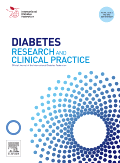
Diabetology & Metabolic Syndrome
Scope & Guideline
Leading the charge in open-access endocrinology.
Introduction
Aims and Scopes
- Diabetes Management and Treatment Strategies:
Research on various treatment modalities for diabetes, including pharmacological interventions (like GLP-1 receptor agonists and SGLT2 inhibitors), dietary approaches, and lifestyle modifications aimed at improving glycemic control and managing diabetes-related complications. - Cardiometabolic Health:
Studies investigating the interrelations between diabetes and cardiovascular diseases, metabolic syndrome, and other comorbidities, focusing on risk factors, outcomes, and management strategies. - Pathophysiology of Diabetes Complications:
Research into the underlying mechanisms of diabetes-related complications, including nephropathy, retinopathy, neuropathy, and cardiovascular disease, often utilizing molecular, genetic, and epigenetic analyses. - Innovative Diagnostic and Monitoring Technologies:
Advancements in diabetes monitoring technologies such as continuous glucose monitoring systems, machine learning applications for diabetes risk prediction, and novel biomarkers for early detection of diabetes-related complications. - Public Health and Epidemiology:
Investigations into the prevalence, risk factors, and socio-economic impacts of diabetes and metabolic syndrome at population levels, aiming to inform public health policies and interventions. - Patient-Centered Care and Education:
Research focusing on the psychosocial aspects of diabetes, including patient education, self-management strategies, and the impact of mental health on diabetes outcomes.
Trending and Emerging
- Molecular Mechanisms and Biomarkers:
There is a growing emphasis on understanding the molecular mechanisms underlying diabetes and its complications, including the identification of novel biomarkers for early detection and monitoring of diabetes-related conditions. - Impact of Gut Microbiota:
Research exploring the relationship between gut microbiota and diabetes has gained traction, focusing on how gut health influences metabolic processes, insulin resistance, and overall diabetes management. - Psychosocial and Behavioral Aspects of Diabetes Management:
Increasing attention is being paid to the psychosocial dimensions of diabetes, including the effects of mental health, stress, and social support on diabetes outcomes, as well as the role of patient education and self-management. - Artificial Intelligence and Digital Health Technologies:
The integration of artificial intelligence and digital health technologies in diabetes management is an emerging trend, with studies focusing on predictive modeling, telemedicine, and mobile health applications to enhance patient care. - Diabetes in Special Populations:
Research focusing on diabetes management and outcomes in specific populations, such as children, adolescents, pregnant women, and ethnic minorities, is gaining importance, reflecting the need for tailored approaches in diabetes care.
Declining or Waning
- Traditional Dietary Interventions:
Research focusing solely on traditional dietary interventions for diabetes management, such as specific diets or food groups, has seen a decline. This shift is likely due to a growing emphasis on personalized nutrition and the role of overall dietary patterns. - Single-Agent Pharmacotherapy Studies:
The focus on studies investigating single-agent pharmacotherapy for diabetes management has waned. There is now a greater interest in combination therapies and multi-faceted approaches that address the complexity of diabetes. - Basic Science Studies with Limited Clinical Relevance:
While basic science research remains important, studies that do not translate findings into clinical or practical applications are less prevalent. The journal is increasingly prioritizing research that has direct implications for patient care and outcomes. - Generalized Population Studies:
Research that broadly examines diabetes prevalence without nuanced analysis of specific populations or subgroups is decreasing. There is a trend towards more targeted studies that consider ethnic, cultural, and socio-economic factors influencing diabetes.
Similar Journals

Annals of Pediatric Endocrinology & Metabolism
Fostering collaboration for innovative pediatric care solutions.Annals of Pediatric Endocrinology & Metabolism, published by the Korean Society of Pediatric Endocrinology, is a vital resource for researchers, healthcare professionals, and students in the fields of endocrinology, diabetes, and pediatric health. With its commitment to open access since 2012, the journal facilitates the dissemination of groundbreaking research on pediatric endocrine disorders and metabolic diseases, ensuring that vital knowledge is accessible to a global audience. The journal maintains a reputable standing with a 2023 Scopus rank of #92 in Pediatrics and a Q3 quartile in Endocrinology, highlighting its impact on the field. Originating from South Korea, the journal fosters a collaborative network of researchers and advocates best practices in pediatric care through interdisciplinary studies. The Annals not only enhances scientific understanding but also emphasizes practical applications aimed at improving child health outcomes, making it an essential publication for academics and practitioners alike.

ENDOCRINE RESEARCH
Exploring innovative insights in hormonal research.ENDOCRINE RESEARCH is a prominent peer-reviewed journal published by TAYLOR & FRANCIS INC, focused on the dynamic field of endocrinology. With an ISSN of 0743-5800 and an E-ISSN of 1532-4206, this journal has been contributing to the scientific community since 1974, providing a platform for researchers to disseminate innovative findings related to hormonal research and its implications in diverse medical contexts. Operating from the United States, it falls within the Q3 quartile ranking in both Endocrinology and Medicine (Miscellaneous), reflecting its recognized impact within these disciplines. While ENDOCRINE RESEARCH currently does not offer open access options, it remains an invaluable resource for professionals, students, and researchers seeking to stay at the forefront of endocrine science and clinical application. The journal invites original research articles, reviews, and case studies, fostering a collaborative environment for discussing the complexities of endocrinological phenomena.

TRENDS IN ENDOCRINOLOGY AND METABOLISM
Unveiling trends that influence metabolic science.TRENDS IN ENDOCRINOLOGY AND METABOLISM, published by CELL PRESS, stands as a pivotal resource in the fields of endocrinology, diabetes, and metabolism. With its ISSN 1043-2760 and E-ISSN 1879-3061, this esteemed journal has been a leading platform since its inception in 1989, currently projected to span until 2024. Recognized within the top quartile (Q1) of its category, it boasts impressive Scopus rankings, holding the 4th position in Endocrinology and 8th in Endocrinology, Diabetes, and Metabolism. These rankings underscore its significant impact, evidenced by an impressive percentile rank of 97th and 96th respectively. The journal is committed to facilitating the dissemination of cutting-edge research and innovative insights, making it an essential read for researchers, clinicians, and students seeking to stay informed on the latest advancements in these critical fields. With a robust focus on providing thorough reviews and original research articles, TRENDS IN ENDOCRINOLOGY AND METABOLISM continues to shape the understanding and treatment of metabolic disorders.

Diabetes & Metabolic Syndrome-Clinical Research & Reviews
Transforming Research into Clinical PracticeDiabetes & Metabolic Syndrome-Clinical Research & Reviews is a leading peer-reviewed journal published by ELSEVIER SCI LTD in the field of endocrinology, diabetes, and internal medicine. With an impressive impact factor evidenced by its high rankings, this journal is positioned in the top quartile (Q1) across multiple categories, including Endocrinology, Diabetes and Metabolism, and Internal Medicine. Spanning from 2007 to 2024, it serves as a vital resource for researchers, healthcare professionals, and students alike, offering comprehensive reviews and innovative clinical research related to metabolic disorders. Located in the Netherlands, the journal emphasizes an open-access approach, ensuring valuable insights are available to a global audience. By publishing high-quality and impactful articles, Diabetes & Metabolic Syndrome not only contributes to the advancement of scientific knowledge but also plays a crucial role in shaping clinical practices and enhancing patient care in the realm of diabetes and metabolic syndrome.

Endocrinology Diabetes and Metabolism Case Reports
Advancing Knowledge in Endocrinology and MetabolismEndocrinology Diabetes and Metabolism Case Reports, published by BIOSCIENTIFICA LTD, stands as a pivotal forum for sharing significant advancements and clinical case studies in the fields of endocrinology, diabetes, and metabolism. With an Open Access model initiated in 2013, this journal encourages the widespread dissemination and accessibility of research findings, promoting collaboration and innovation among scholars and healthcare professionals. Based in the United Kingdom, the journal features a focus on practical applications and unique case reporting that enriches the clinical understanding and management of complex endocrine disorders. Though currently it's ranked in the Q3 category for both Endocrinology, Diabetes and Metabolism and Internal Medicine, its ongoing commitment to quality and impact in clinical research makes it a valuable resource for researchers, professionals, and students alike, contributing to the advancement of knowledge in this critical medical domain.

DIABETES RESEARCH AND CLINICAL PRACTICE
Empowering healthcare professionals with cutting-edge diabetes research.DIABETES RESEARCH AND CLINICAL PRACTICE, published by Elsevier Ireland Ltd, is a leading peer-reviewed journal in the realms of endocrinology, diabetes, and internal medicine. With a prestigious Q1 classification across several categories, including Endocrinology, Diabetes and Metabolism, and Internal Medicine, this journal is recognized for its impactful contributions to advancing knowledge and clinical practice in diabetes care, boasting an impressive impact factor that underscores its significance in the academic community. Spanning from 1985 to 2024, this journal not only disseminates high-quality research but also serves as a critical resource for healthcare professionals, researchers, and students alike who are focused on addressing the global diabetes epidemic. With its comprehensive scope and commitment to fostering innovative findings, DIABETES RESEARCH AND CLINICAL PRACTICE remains at the forefront of its field, fostering collaboration and discovery to improve patient outcomes.

Diabetes Stoffwechsel und Herz
Exploring the Nexus of Diabetes and Cardiovascular HealthDiabetes Stoffwechsel und Herz, published by VERLAG KIRCHHEIM, is a distinguished journal that focuses on the interdisciplinary field of diabetes research, cardiology, and metabolic disorders. With its dedicated approach, the journal aims to disseminate cutting-edge findings and foster innovative discussions among researchers and practitioners in the healthcare community. Despite its discontinuation in Scopus coverage since 2017, the journal continues to hold significance in advancing knowledge regarding the intricate relationship between diabetes and cardiovascular health. It offers researchers a platform to explore the biochemical, genetic, and clinical aspects of endocrinology, while also catering to the needs of professionals aiming to apply the latest research in their practice. The journal’s rankings, which place it in the lower percentiles across various relevant categories, reflect a unique opportunity for contributors looking to impact a niche yet vital area of medicine. As the field evolves, Diabetes Stoffwechsel und Herz remains committed to enriching the dialogue surrounding these critical health issues.

Journal of Diabetology
Driving progress in diabetes research and treatment.The Journal of Diabetology, published by Wolters Kluwer Medknow Publications, is a premier platform dedicated to advancing the understanding and management of diabetes and related metabolic disorders. Since its inception in 2010, this Open Access journal has provided researchers and healthcare professionals with a wealth of knowledge through rigorous peer-reviewed articles that cover clinical research, epidemiology, and innovative treatment strategies. With an E-ISSN of 2078-7685 and a commitment to disseminating high-quality scientific work, the journal plays a pivotal role in contributing to the global discourse on diabetes care and prevention. Its dedication to accessibility enhances its impact on both established scholars and emerging researchers seeking to make meaningful contributions in the field. By fostering a collaborative environment, the Journal of Diabetology aims to bridge the gap between research and practical implementation, ultimately improving outcomes for individuals affected by diabetes.

Cardiovascular Endocrinology & Metabolism
Unlocking the Connections Between Heart and Hormonal HealthCardiovascular Endocrinology & Metabolism is a leading open-access journal dedicated to advancing our understanding of the interconnections between cardiovascular health and endocrine functions. Published by Lippincott Williams & Wilkins, this journal serves as a vital resource for researchers and clinicians alike, providing timely insights into the intricate relationships between metabolic disorders and cardiovascular diseases. With an impressive impact factor and categorized in Q2 for both Cardiology and Cardiovascular Medicine as well as Endocrinology, Diabetes, and Metabolism, it holds a significant position within its respective fields. The journal has been fully open access since its inception in 2012, ensuring that critical research is accessible to a global audience. By fostering innovation and collaboration, Cardiovascular Endocrinology & Metabolism aims to promote better health outcomes and stimulate novel research directions, making it an essential resource for professionals striving to bridge the gaps between these two critical domains.

DIABETES OBESITY & METABOLISM
Transforming insights into impactful clinical applications.DIABETES OBESITY & METABOLISM, published by Wiley, is a premier international journal dedicated to the fields of endocrinology, diabetes, and metabolic disorders. With an impressive impact factor and its status as a Q1 journal in multiple categories—including Endocrinology and Internal Medicine—this publication is highly regarded in the academic community. Since its inception in 1999, the journal has served as a crucial platform for the dissemination of cutting-edge research, reviews, and clinical studies, driving advancements in understanding and treatment of diabetes and obesity. Researchers and professionals alike benefit from its rigorous peer-review process and extensive reach, as it aims to bridge the gap between laboratory findings and clinical applications. Although not an Open Access journal, articles are accessible through institutional subscriptions, ensuring that vital knowledge reaches those committed to enhancing patient care and expanding the scientific body of work in these pivotal areas.